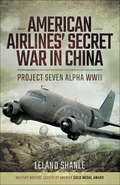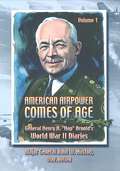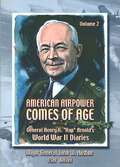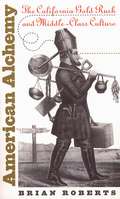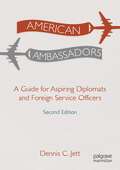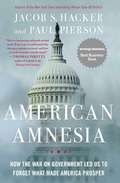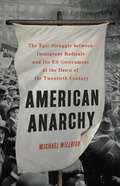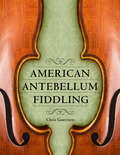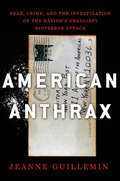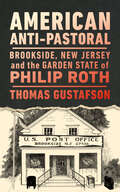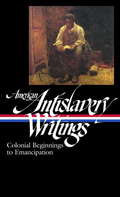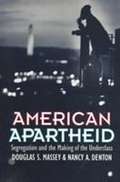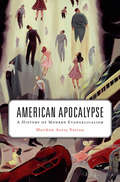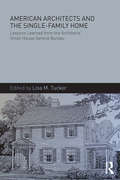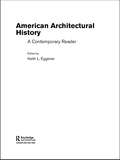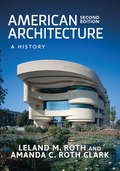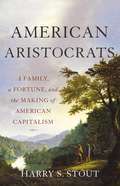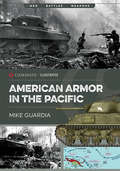- Table View
- List View
American Airline's Secret War in China: Project Seven Alpha, WWII
by Leland ShanleIn late 1941, President Roosevelt agonized over the rapid advances of the Japanese forces in Asia; they seemed unstoppable. He foresaw their intentions of taking India and linking up with the two other Axis Powers, Germany and Italy, in an attempt to conquer the Eastern Hemisphere. US naval forces had been surprised and diminished in Pearl Harbor and the army was not only outnumbered but also ill-prepared to take on the invading hoards. One of Roosevelts few options was to form a defensive line on the eastern side of the Patkai and Himalayan Ranges; there, he could look for support from the Chinese and Burmese. It was the only defence to a Japanese invasion of India.To support and supply the troops who were fighting in hostile jungle terrain, where overland routes had been cut off, he desperately needed to set up an air supply from Eastern India. His problem was lack of aircraft and experienced pilots to fly the dangerous Hump, over the worlds highest mountains. Hence the inception of Operation Seven Alpha, a plan to enlist the aircraft—DC-3s—and the pilots—veterans of World War One—of American Airlines. This newly formed elite Squadron would fly the medium-range aircraft in a series of long-distance hops across the Pacific and Southern Asia to the Assam Valley in India. They would then create and operate the vital supply route, carrying arms, ammunition and food Eastward to the Allied bases, before returning with wounded personnel. This is the story of that little-known operation, carried out in the early days of the Burma Campaign.The book is based on first-hand experiences of those who were involved, and it serves as a fitting tribute to the bravery and inventiveness of a band of men who answered their countrys desperate call at the outset of the war against Japan in Asia.
American Airpower Comes Of Age—General Henry H. “Hap” Arnold’s World War II Diaries Vol. I [Illustrated Edition] (General Henry H. “Hap” Arnold’s World War II Diaries #1)
by Maj.-Gen John W. Huston Gen. Henry H. “Hap.” ArnoldIncludes the Aerial Warfare In Europe During World War II illustrations pack with over 180 maps, plans, and photos.Gen Henry H. "Hap." Arnold, US Army Air Forces (AAF) Chief of Staff during World War II, maintained diaries for his several journeys to various meetings and conferences throughout the conflict. Volume 1 introduces Hap Arnold, the setting for five of his journeys, the diaries he kept, and evaluations of those journeys and their consequences. General Arnold's travels brought him into strategy meetings and personal conversations with virtually all leaders of Allied forces as well as many AAF troops around the world. He recorded his impressions, feelings, and expectations in his diaries. Maj Gen John W. Huston, USAF, retired, has captured the essence of Henry H. Hap Arnold--the man, the officer, the AAF chief, and his mission. Volume 2 encompasses General Arnold's final seven journeys and the diaries he kept therein.
American Airpower Comes Of Age—General Henry H. “Hap” Arnold’s World War II Diaries Vol. II [Illustrated Edition] (General Henry H. “Hap” Arnold’s World War II Diaries #2)
by Maj.-Gen John W. Huston Gen. Henry H. “Hap.” ArnoldIncludes the Aerial Warfare In Europe During World War II illustrations pack with over 180 maps, plans, and photos.Gen Henry H. "Hap." Arnold, US Army Air Forces (AAF) Chief of Staff during World War II, maintained diaries for his several journeys to various meetings and conferences throughout the conflict. Volume 1 introduces Hap Arnold, the setting for five of his journeys, the diaries he kept, and evaluations of those journeys and their consequences. General Arnold's travels brought him into strategy meetings and personal conversations with virtually all leaders of Allied forces as well as many AAF troops around the world. He recorded his impressions, feelings, and expectations in his diaries. Maj Gen John W. Huston, USAF, retired, has captured the essence of Henry H. Hap Arnold--the man, the officer, the AAF chief, and his mission. Volume 2 encompasses General Arnold's final seven journeys and the diaries he kept therein.
American Alchemy
by Brian RobertsCalifornia during the gold rush was a place of disputed claims, shoot-outs, gambling halls, and prostitution; a place populated by that rough and rebellious figure, the forty-niner; in short, a place that seems utterly unconnected to middle-class culture. In American Alchemy, however, Brian Roberts offers a surprising challenge to this assumption.Roberts points to a long-neglected truth of the gold rush: many of the northeastern forty-niners who ventured westward were in fact middle-class in origin, status, and values. Tracing the experiences and adventures both of these men and of the "unseen" forty-niners--women who stayed back East while their husbands went out West--he shows that, whatever else the gold seekers abandoned on the road to California, they did not simply turn their backs on middle-class culture.Ultimately, Roberts argues, the story told here reveals an overlooked chapter in the history of the formation of the middle class. While the acquisition of respectability reflects one stage in this history, he says, the gold rush constitutes a second stage--a rebellion against standards of respectability.
American Ambassadors: A Guide for Aspiring Diplomats and Foreign Service Officers
by Dennis C. JettIf you ever wondered who becomes an American ambassador and why, this is the book for you. It describes how Foreign Service officers become ambassadors by rising up through the ranks, and why they typically make up about 70 percent of the total number of ambassadors. It also covers where the other 30 percent come from—the political appointees who get the job because they helped elect the president by supporting him as a campaign contributor, a political ally, or a personal friend. It explains why, despite being illegal and a threat to national security, selling the title of ambassador remains a common practice that is also unique to the United States. It considers why some suggestions for reform are misguided, what might be done, and why who the president is matters so much in determining how well the United States will be represented abroad. This updated and revised edition of Jett's classic book not only provides a timely overview of American ambassadorship for Foreign Service Officers, aspiring diplomats, and interested citizens, but also calls for much-needed reform, describing the dire implications of failing to change our ambassadorial appointments process for the future of American diplomatic practice and foreign policy.
American Amnesia: How the War on Government Led Us to Forget What Made America Prosper
by Jacob S. Hacker Paul PiersonFrom the groundbreaking author team behind the bestselling Winner-Take-All Politics, a timely and topical work that examines what's good for American business and what's good for Americans--and why those interests are misaligned.In Winner-Take-All Politics, Jacob S. Hacker and Paul Pierson explained how political elites have enabled and propelled plutocracy. Now in American Amnesia, they trace the economic and political history of the United States over the last century and show how a viable mixed economy has long been the dominant engine of America's prosperity. Like every other prospering democracy, the United States developed a mixed economy that channeled the spirit of capitalism into strong growth and healthy social development. In this bargain, government and business were as much partners as rivals. Public investments in education, science, transportation, and technology laid the foundation for broadly based prosperity. Programs of economic security and progressive taxation provided a floor of protection and business focused on the pursuit of profit--and government addressed needs business could not. The mixed economy was the most important social innovation of the twentieth century. It spread a previously unimaginable level of broad prosperity. It enabled steep increases in education, health, longevity, and economic security. And yet, extraordinarily, it is anathema to many current economic and political elites. And as the advocates of anti-government free market fundamentalist have gained power, they are hell-bent on scrapping the instrument of nearly a century of unprecedented economic and social progress. In American Amnesia, Hacker and Pierson explain how--and why they must be stopped.
American Anarchy: The Epic Struggle between Immigrant Radicals and the US Government at the Dawn of the Twentieth Century
by Michael WillrichA "lively, fast-paced history" (Adam Hochschild, bestselling author of American Midnight) of America&’s anarchist movement and the government&’s tireless efforts to destroy it In the early twentieth century, anarchists like Emma Goldman and Alexander Berkman championed a radical vision of a world without states, laws, or private property. Militant and sometimes violent, anarchists were heroes to many working-class immigrants. But to many others, anarchism was a terrifyingly foreign ideology. Determined to crush it, government officials launched a decades-long &“war on anarchy,&” a brutal program of spying, censorship, and deportation that set the foundations of the modern surveillance state. The lawyers who came to the anarchists&’ defense advanced groundbreaking arguments for free speech and due process, inspiring the emergence of the civil liberties movement.American Anarchy tells the gripping tale of the anarchists, their allies, and their enemies, showing how their battles over freedom and power still shape our public life.
American Antebellum Fiddling (American Made Music Series)
by Chris GoertzenThis unique volume is the only book solely about antebellum American fiddling. It includes more than 250 easy-to-read and clearly notated fiddle tunes alongside biographies of fiddlers and careful analysis of their personal tune collections. The reader learns what the tunes of the day were, what the fiddlers’ lives were like, and as much as can be discovered about how fiddling sounded then. Personal histories and tunes’ biographies offer an accessible window on a fascinating period, on decades of growth and change, and on rich cultural history made audible. In the decades before the Civil War, American fiddling thrived mostly in oral tradition, but some fiddlers also wrote down versions of their tunes. This overlap between oral and written traditions reveals much about the sounds and social contexts of fiddling at that time. In the early 1800s, aspiring young violinists maintained manuscript collections of tunes they intended to learn. These books contained notations of oral-tradition dance tunes—many of them melodies that predated and would survive this era—plus plenty of song melodies and marches. Chris Goertzen takes us into the lives and repertoires of two such young men, Arthur McArthur and Philander Seward. Later, in the 1830s to 1850s, music publications grew in size and shrunk in cost, so fewer musicians kept personal manuscript collections. But a pair of energetic musicians did. Goertzen tells the stories of two remarkable violinist/fiddlers who wrote down many hundreds of tunes and whose notations of those tunes are wonderfully detailed, Charles M. Cobb and William Sidney Mount. Goertzen closes by examining particularly problematic collections. He takes a fresh look at George Knauff’s Virginia Reels and presents and analyzes an amateur musician’s own questionable but valuable transcriptions of his grandfather’s fiddling, which reaches back to antebellum western Virginia.
American Anthem: Modern American History
by Edward L. Ayers Robert D. Schulzinger Jesús F. de la Teja Deborah Gray WhiteAmerican Anthem, Modern American History: Student Edition writes down the facts and events in the American History. The activities of the people who made the nation and made a difference in the world. The authors published this book in an exciting way to study history, not just facts and dates students needed to know to ace their examinations. It interprates history written by other authors in a different time from the past but in a tasteful and meaningful connection of activities. It has also managed to capture visual evidence of various activities in history, paintings, photographs and other visual media.
American Anthrax: Fear, Crime, and the Investigation of the Nation's Deadliest Bioterror Attack
by Jeanne GuilleminFrom Jeanne Guillemin, one of the world's leading experts on anthrax and bioterrorism, the definitive account of the anthrax investigationIt was the most complex case in FBI history. In what became a seven-year investigation that began shortly after 9/11—with America reeling from the terror attacks of al Qaeda—virulent anthrax spores sent through the mail killed Bob Stevens, a Florida tabloid photo editor. His death and, days later, the discovery in New York and Washington, D.C. of letters filled with anthrax sent shock waves through the nation. Federal agencies were blindsided by the attacks, which eventually killed five people. Taken off guard, the FBI struggled to combine on-the-ground criminal investigation with progress in advanced bioforensic analyses of the letters' contents. While the criminal eluded justice, disinformation swirled around the letters, erroneously linking them to Iraq's WMD threat and foreign bioterrorism. Without oversight, billions were lavished on biomedical defenses against anthrax and other exotic diseases. Worst of all, faith in federal justice faltered. American Anthrax is a gripping tale of terror, intrigue, madness, and cover-up.
American Anti-Pastoral: Brookside, New Jersey and the Garden State of Philip Roth (CERES: Rutgers Studies in History)
by Thomas GustafsonOne of the best-known novels taking place in New Jersey, Philip Roth’s 1997 American Pastoral uses the fictional hamlet of Old Rimrock, NJ as a microcosm for a nation in crisis during the cultural upheavals of the 1960s-70s. Critics have called Old Rimrock mythic, but it is based on a very real place: the small Morris county town of Brookside, New Jersey. American Anti-Pastoral reads the events in Roth’s novel in relation to the history of Brookside and its region. While Roth’s protagonist Seymour “Swede” Levov initially views Old Rimrock as an idyllic paradise within the Garden State, its real-world counterpart has a more complex past in its origins as a small industrial village, as well as a site for the politics of exclusionary zoning and a 1960s anti-war protest at its celebrated 4th of July parade. Literary historian and Brookside native Thomas Gustafson casts Roth’s canonical novel in a fresh light as he studies both Old Rimrock in comparison to Brookside and the novel in relationship to NJ literature, making a case for it as the Great New Jersey novel. For Roth fans and history buffs alike, American Anti-Pastoral peels back the myths about the bucolic Garden State countryside to reveal deep fissures along the fault-lines of race and religion in American democracy.
American Antislavery Writings: Colonial Beginnings to Emancipation
by Various James G. BaskerFor the 150th anniversary of the Emancipation Proclamation, here is a collection of writings that charts our nation's long, heroic confrontation with its most poisonous evil. It's an inspiring moral and political struggle whose evolution parallels the story of America itself. To advance their cause, the opponents of slavery employed every available literary form: fiction and poetry, essay and autobiography, sermons, pamphlets, speeches, hymns, plays, even children's literature. This is the first anthology to take the full measure of a body of writing that spans nearly two centuries and, exceptionally for its time, embraced writers black and white, male and female. Benjamin Franklin, Thomas Paine, Phillis Wheatley, and Olaudah Equiano offer original, even revolutionary, eighteenth century responses to slavery. With the nineteenth century, an already diverse movement becomes even more varied: the impassioned rhetoric of Frederick Douglass and William Lloyd Garrison joins the fiction of Harriet Beecher Stowe, Louisa May Alcott, and William Wells Brown; memoirs of former slaves stand alongside protest poems by John Greenleaf Whittier, Henry Wadsworth Longfellow, and Lydia Sigourney; anonymous editorials complement speeches by statesmen such as Charles Sumner and Abraham Lincoln. Features helpful notes, a chronology of the antislavery movement, and a16-page color insert of illustrations.
American Apartheid: Segregation and the Making of the Underclass
by Nancy Denton Douglas MasseyA study of segregation as the root of many problems facing African-Americans today.
American Apocalypse: A History of Modern Evangelicalism
by Matthew Avery SuttonThe first comprehensive history of modern American evangelicalism to appear in a generation, American Apocalypse shows how a group of radical Protestants, anticipating the end of the world, paradoxically transformed it. Matthew Avery Sutton draws on extensive archival research to document the ways an initially obscure network of charismatic preachers and their followers reshaped American religion, at home and abroad, for over a century. Perceiving the United States as besieged by Satanic forces: communism and secularism, family breakdown and government encroachment, Billy Sunday, Charles Fuller, Billy Graham, and others took to the pulpit and airwaves to explain how Biblical end-times prophecy made sense of a world ravaged by global wars, genocide, and the threat of nuclear extinction. Believing Armageddon was nigh, these preachers used what little time was left to warn of the coming Antichrist, save souls, and prepare the nation for God's final judgment. By the 1980s, President Ronald Reagan and conservative Republicans appropriated evangelical ideas to create a morally infused political agenda that challenged the pragmatic tradition of governance through compromise and consensus. Following 9/11, the politics of apocalypse continued to resonate with an anxious populace seeking a roadmap through a world spinning out of control. Premillennialist evangelicals have erected mega-churches, shaped the culture wars, made and destroyed presidential hopefuls, and brought meaning to millions of believers. Narrating the story of modern evangelicalism from the perspective of the faithful, Sutton demonstrates how apocalyptic thinking continues to exert enormous influence over the American mainstream today.
American Apocalypse: A History of Modern Evangelicalism
by Matthew Avery SuttonIn the first comprehensive history of American evangelicalism to appear in a generation, Matthew Sutton shows how charismatic Protestant preachers, anticipating the end of the world, paradoxically transformed it. Narrating the story from the perspective of the faithful, he shows how apocalyptic thinking influences the American mainstream today.
American Apocalypse: The Six Far-Right Groups Waging War on Democracy
by Rena SteinzorA thorough analysis of the right-wing interests contributing to the downfall of American democracy The war on American democracy is at a fever pitch. Such a corrosive state of affairs did not arise spontaneously up from the people but instead was pushed, top-down, by six private sector special interest groups—big business, the House Freedom Caucus, the Federalist Society, Fox News, white evangelicals, and armed militias. In American Apocalypse Rena Steinzor argues that these groups are nothing more than well-financed armies fighting a battle of attrition against the national government, with power, money, and fame as their central motivations. The book begins at the end of Lyndon Johnson's presidency, when the modern regulatory state was born. Agencies like the Environmental Protection Agency and the Food and Drug Administration ensured that everything from our air to our medicine was safe. But efforts to thwart this "big government" agenda began swiftly, albeit in the shadows. Business leaders built a multi-billion dollar presence in the Capitol, and the rest of the six interest groups soon followed. While the groups do not coordinate their attacks, and sometimes their short-term goals even conflict, their priorities fall within a surprisingly tight bullseye: the size and power of the administrative state. In the near-term, their campaigns will bring the crucial functions of government to a halt, which will lead to immediate suffering by the working classes, and a rapid deterioration of race relations. Over the long-term, as the prevalence of global pandemics and climate crises increase, an incapacitated national government will usher in unimaginable harm. This book is the first to conceptualize these groups together, as one deconstructive and awe-inspiring force. Steinzor delves into each of their histories, mapping the strategies, tactics, and characteristics that make them so powerful. She offers the most comprehensive story available about the downfall of American democracy, reminding us that only by recognizing what we are up against can we hope to bring about change.
American Architects and the Single-Family Home: Lessons Learned from the Architects' Small House Service Bureau
by Lisa M. TuckerAmerican Architects and the Single-Family Home explains how a small group of architects started the Architects’ Small House Service Bureau in 1919 and changed the course of twentieth-century residential design for the better. Concepts and principles they developed related to public spaces, private spaces, and service spaces for living; details about the books they published to promote good design; as well as new essays from contemporary practitioners will inspire your own designs. More than 200 black and white images.
American Architectural History: A Contemporary Reader
by Keith Eggener<p>This major new text presents a collection of recent writings on architecture and urbanism in the United States, with topics ranging from colonial to contemporary times. In terms of content and scope, there is no collection, in or out of print, directly comparable to this one. The essays are drawn from the past twenty years' of publishing in the field, arranged chronologically from colonial to contemporary and accessible in thematic groupings, contextualized and introduced by Keith Eggener. <p>Drawing together 24 illustrated essays by major and emerging scholars in the field, American Architectural History is a valuable resource for students of the history of American art, architecture, urbanism, and material culture.</p>
American Architecture and Urbanism
by Vincent ScullyA classic book authored by the foremost architectural historian in America, this fully illustrated history of American architecture and city planning is based on Vincent Scully's conviction that architecture and city planning are inseparably linked and must therefore be treated together. He defines architecture as a continuing dialogue between generations which creates an environment across time. This definitive survey extends beyond the cities themselves to the American scene as a whole, which has inspired the reasonable balanced, closed and ordered forms, and above all the probity, that he feels typifies American architecture.
American Architecture and Urbanism
by Vincent ScullyA classic book authored by the foremost architectural historian in America, this fully illustrated history of American architecture and city planning is based on Vincent Scully's conviction that architecture and city planning are inseparably linked and must therefore be treated together. He defines architecture as a continuing dialogue between generations which creates an environment across time. This definitive survey extends beyond the cities themselves to the American scene as a whole, which has inspired the reasonable balanced, closed and ordered forms, and above all the probity, that he feels typifies American architecture.
American Architecture: 1607-1860
by Marcus Whiffen Frederick KoeperThe first volume of a two-volume survey of American Architecture, this book covers architectural developments from Jamestown to the Civil War.
American Architecture: A History
by Amanda C. Clark Leland M. RothThis widely acclaimed, highly illustrated introduction to the history of American architecture is now fully revised throughout. American Architecture introduces readers to the major developments that shaped the American-built environment from the first Americans to the present, from the everyday vernacular to the high style of aspiration.Significant updates include: A new chapter on the 21st century, detailing the green architecture movement and LEED status architecture, the influence of CAD design on recent architecture, the necessity of sustainable design, the globalization of architecture and international architects, and some of the preservation issues facing architecture today. An expanded section on Native American architecture including contemporary design by Native American architects, expanded discussions on architectural education and training, more examples of women architects and designers, and a thoroughly expanded glossary to help today's readers. A revised and expanded art program, including over 640 black and white images, and a new 32-page, full-color insert featuring over 60 new color images.American Architecture describes the impact of changes in conceptual imagery, style, building technology, landscape design, vernacular construction, and town-planning theory throughout U.S. history. Eleven chronologically organized chapters chart the social, cultural, and political forces that shaped the growth and development of American towns, cities, and suburbs, while providing full description, analysis, and interpretation of buildings and their architects. Accessible and engaging, American Architecture continues to set the standard as a guide, study, and reference.
American Aristocrats: A Family, a Fortune, and the Making of American Capitalism
by Harry S. StoutThe story of an ambitious family at the forefront of the great middle-class land grab that shaped early American capitalismAmerican Aristocrats is a multigenerational biography of the Andersons of Kentucky, a family of strivers who passionately believed in the promise of America. Beginning in 1773 with the family patriarch, a twice-wounded Revolutionary War hero, the Andersons amassed land throughout what was then the American west. As the eminent religious historian Harry S. Stout argues, the story of the Andersons is the story of America's experiment in republican capitalism. Congressmen, diplomats, and military generals, the Andersons enthusiastically embraced the emerging American gospel of land speculation. In the process, they became apologists for slavery and Indian removal, and worried anxiously that the volatility of the market might lead them to ruin.Drawing on a vast store of Anderson family records, Stout reconstructs their journey to great wealth as they rode out the cataclysms of their time, from financial panics to the Civil War and beyond. Through the Andersons we see how the lure of wealth shaped American capitalism and the nation's continental aspirations.
American Armor in the Pacific (Casemate Illustrated #Cis0012)
by Mike GuardiaAn illustrated history of the American tanks deployed to the Pacific theater during World War II and the conflicts they faced there. This volume in the Casemate Illustrated series explores American armor during the Pacific Campaign of the Second World War, from 1942 to 1945. In this period, there were over twenty major tank battles and operations in which tanks provided heavy support to infantry units. These operations included the Battle of Tarawa and the Bougainville Campaign. American Armor in the Pacific also features the strategies and tactics of the opposing forces, relying heavily on first-person accounts. This book examines the Pacific theater and how American armor was employed with great success in that theater of war. It also offers detailed information on American and Japanese armored forces, including development, equipment, capabilities, organization, and order of battle. Praise for American Armor in the Pacific &“Packed with over 100 images . . . exactly what a reader interested in the armored battles fought between the Imperial Japanese war machine and U.S. military would want to see.&” —Globe at War
American Art Since 1900: A Critical History
by Barbara RoseThe history of American art since 1900, especially with regard to its European roots and subsequent transformation.
